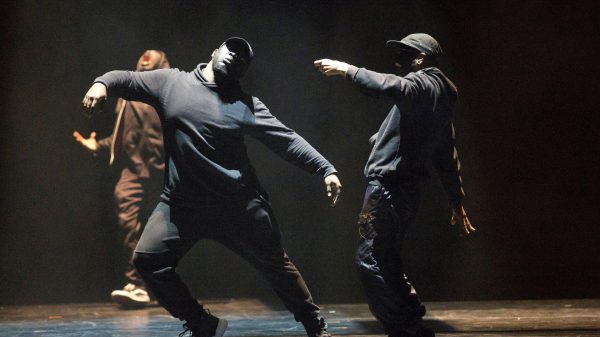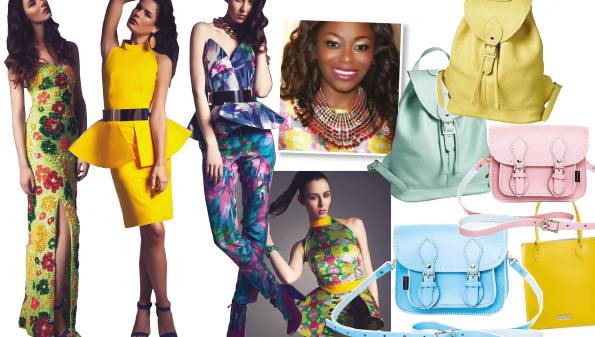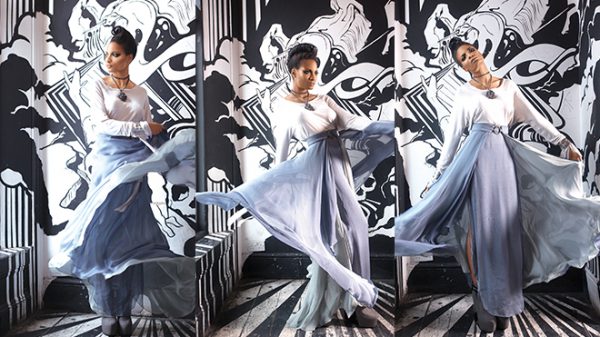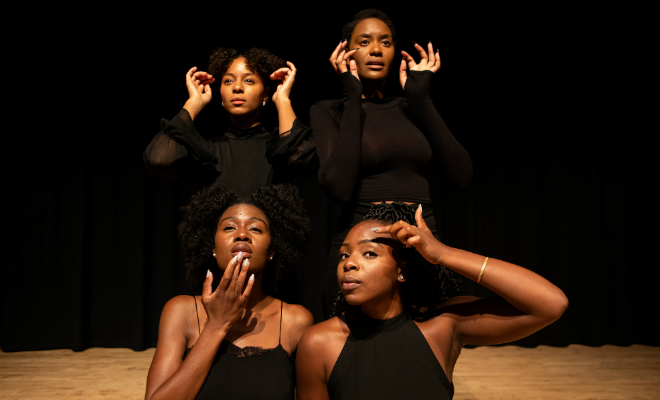Director Jessica Kaliisa tells Nicole Vassell about Queens of Sheba, a play in which Black women speak their truths without apology, and inspired by the DSTRKT nightclub story from 2015
Coined by queer Black feminist Moya Bailey in 2010, ‘misogynoir’ is the term used to describe the specific prejudice directed towards Black women where race and gender both influence the bias – a combination of ‘misogyny’ and ‘noir’, the French word for black. With the burdens of both racism and sexism imposed upon us by society, Black women sit at a specific intersection of identities – and misogynoir is too often an explanation for the negative treatment that many face.
For some, it’s a news incident that provides an introduction to a new term that helps describe the world better – and for Jessica Kaliisa, the term ‘misogynoir’ was introduced to her in 2015, following the national headlines that followed after four Black women were denied entry to London nightclub, DSTRKT. Though its staff denied having a racist door policy, DSTRKT was accused of blocking a group of friends from attending a club night due to their being dark-skinned Black women as part of their group. When the story was told online, it quickly went viral and became a trending topic as many other Black women shared experiences of similar treatment at nightclubs – particularly ‘high-end’ establishments with frequent celebrity appearances. Ironically, many of them are Black performers, which makes evident a double standard for when Blackness is acceptable and welcomed.
A university student at the time, Kaliisa was working on her documentary dissertation, and based her entire project around ‘misogynoir’ and the ways in which it presents itself. Part of it included a conversation with Zalika Miller, one of the women from the DSTRKT incident, which gave her first-hand knowledge of the moment. However, it wasn’t until Kaliisa watched Timbuktu, a four-person play about the experiences of being a Black man produced by Nouveau Riche, that the cogs for Queens of Sheba started turning – and she thought that the experiences of Black women deserved some stage attention too.
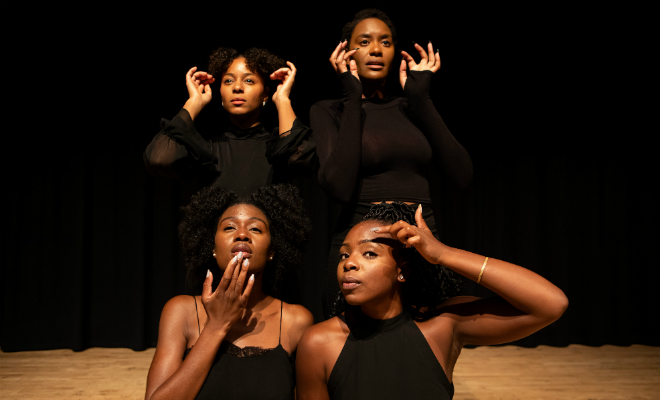
‘I showed all my research, and my documentary to Ryan [Calais Cameron, the artistic director of Nouveau Riché], and showed him that there were so many Black women’s stories to tell,’ she tells me over a phone call. ‘We ran some focus group sessions with Black women, and we spoke openly about topics like hair, skin tone, bodies. It was such an eye-opener – for one, I never realised that I was going through these things before people articulated them.
‘I always felt something but I didn’t know what it was. I felt I was alone in feeling this way, or it was me being silly or sensitive. This feeling of going into work and having to dim myself down, to not be ‘too much’; people not understanding my lingo… We took all of that, took it to Jessica L. Hagan, and she created some spoken word pieces – and we took it from there.’
Indeed, the rest is history – as from Kaliisa’s ideas, Hagan’s spoken word pieces and Cameron’s adaptation for the stage, Queens of Sheba was born. A non-traditional theatre piece, the performance centres actors Eshe Asante, Tosin Alabi, Kokoma ‘Koko’ Kwaku and Elisha Robin as they express through song, rap, spoken word and verse their experiences of being Black women. With the DSTRKT incident as its loose narrative thread, the Queens tell their stories while getting ready for a night out, as well as after the incident.
‘This play is great because these are these amazing Black women telling their stories, written by a Black woman, for Black women.’
‘Throughout that journey to the club moment, they’re talking amongst themselves and to the audience about what it’s like to be a Black woman in this society,’ Kaliisa explains. ‘They talk about everything from microaggressions to going on dates with white guys and being fetishised, all of it.’
After making its debut in 2018, Queens of Sheba returned to theatres early this year and was a standout at the Edinburgh Fringe Festival. A key part of this show’s uniqueness is its stripped nature: a plain black set, with plain black outfits and minimal props, the Queens and their talents take full focus.
‘We didn’t want the words of the Queens to get lost due to things going on in the back,’ Kaliisa says. ‘In terms of including the singing and dancing – Black women are known for having great voices. Now, that might be a stereotype,’ she laughs, ‘but the greatest singers of the past are known to be Black women. So, as a Black women-led show, here’s what we do – we can act, sing, dance, move, we can rap. It’s a celebration of all of our talents while talking about our experiences. Every scene lays in the hand of the Queens and what they create. You can never say, ‘this play was good because of the lighting, or the costumes.’ It’s great because these are these amazing Black women telling their stories, written by a Black woman, for Black women.’
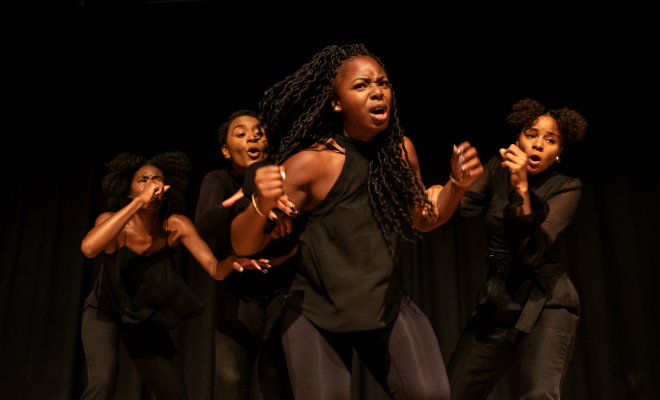
Happily, the play has received rave reviews, and great feedback from the audience – from the Black women who can relate to the content directly, to those who instead of feeling the same, might unwittingly be a perpetrator of misogynoir themselves. One of Kaliisa’s most treasured memories came when a woman in the audience showed just how deeply she felt the words that she was hearing.
‘One of the characters was about to say a line about her experiences at work, and one woman in the audience said it before she had the chance – she knew exactly what she was going to say, and it came to her naturally,’ she recalls. ‘I was just like, Wow – this is really speaking on behalf of every Black woman.’
However, now that there are pieces such as Queens of Sheba that directly call out the prevalence of misogynoir when navigating life as a Black woman, it doesn’t mean that the problem is fixed. In Kaliisa’s eyes, though the existence of misogynoir is being called out more in recent years, the battle is not over.
‘It is a conversation now, more than it would have been 15 or 20 years ago,’ she explains. ‘I think we’re now realising where, as Black women, we deserve to not be treated the way we’ve been treated, but there is a way to go. It’s so important for us to find words for how we’re feeling, which is why I do appreciate words like ‘misogynoir’. For so long, it’s been difficult to identify what Black women go through specifically. Yes, there’s racism, yes, there’s sexism, and people often face either-or. To face both, other people don’t give it much thought. I think only now we’re beginning to truly understand what it is we’ve been feeling.’
A production of Nouveau Riché and Omnibus Theatre, Queens of Sheba continues its UK run from 6th November to 29th November 2019, running at Battersea Arts Centre, London from 18th to 23rd. For individual dates, venues and tickets, visit omnibus-clapham.org/queens-of-sheba-on-tour






